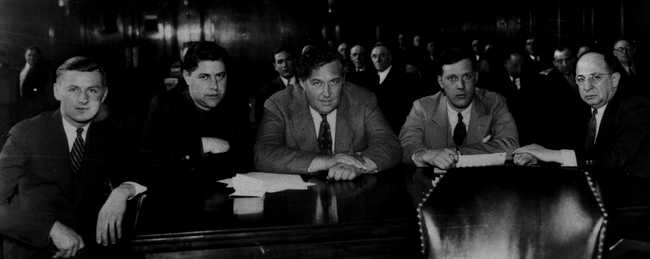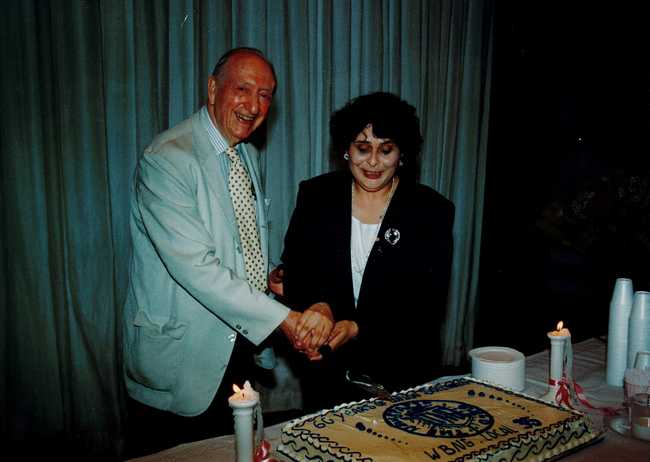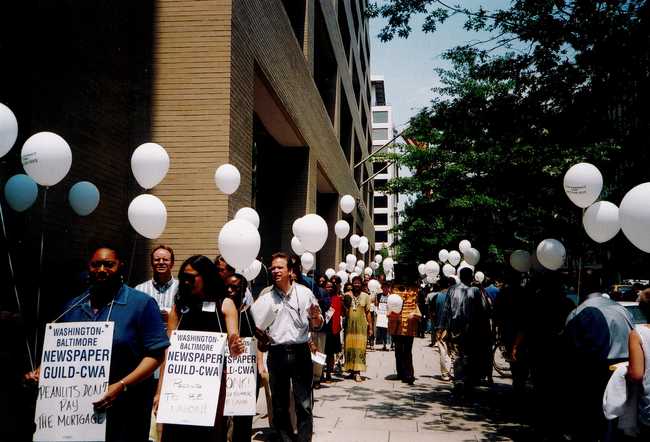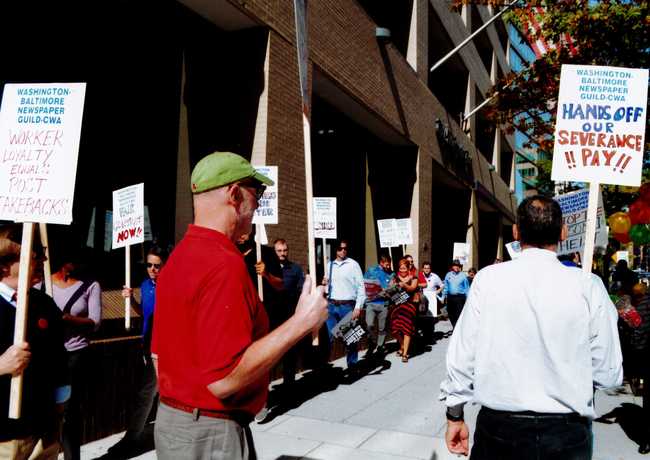
About the Guild
About us | Organizational structure | History of the guild
The Washington Post Newspaper Guild has been a voice for employees at the company since 1934. We represent 1,000 people across the newsroom and in our commercial operations — including award-winning journalists and the talented marketing, advertising and printing plant staff who help readers and watchers find their work.
Every two years, The Post Guild forms a bargaining committee that sits at the table with Washington Post management to negotiate a fair contract for employees. This is The Post Guild’s most critical job. In the off-season, our core leadership works with other members on a variety of committees to ensure Post employees feel empowered and that their needs are met and voices are heard.
We’re proud to work at The Washington Post, a news organization that leads the industry in with its impactful journalism. The Post Guild is working to ensure that the company also sets the example for how newsrooms should treat their journalists.
Organizational Structure
The Washington Post Newspaper Guild
Our unit is one of 27 organized under the Washington-Baltimore News Guild. We’ve been advocating for Post staffers since our founding in 1934. We are an open-shop union, which means we represent more than 1,000 employees of The Washington Post — whether they pay dues or not. The benefit of membership, of course, is that the success of collective bargaining depends entirely on our buy-in.
Washington-Baltimore News Guild
First founded as a union for journalists, the WBNG now represents more than 2,600 news, information and labor-organization workers — including The Washington Post Newspaper Guild. WBNG is headquartered in Washington, D.C., across the street from our newsroom.
The NewsGuild
The NewsGuild international union — which represents 25,000 members in the United States and Canada — is one of nine sectors within the CWA.
Communication Workers of America
The CWA is a labor union that represents 750,000 members across North America.
History of the Guild
Much like The Washington Post news organization, The Washington Post Newspaper Guild has changed and evolved over the decades — positioning itself as the progressive lead advocating for the rights of the people who make The Washington Post great.
Some of the most beloved journalists in Washington Post history have been unwavering guild supporters. We have made headlines, too, for byline strikes, lawsuits and walkouts. Like most institutions, our history is spotted with highs and lows. But it is nevertheless extensive and rich. Here’s a recap.
Timeline

1933: The American Newspaper Guild is founded by famed New York columnist Heywood Broun, who believed journalism could be a force for change and righting social injustice. Broun was married to journalist Ruth Hale, a feminist who advocated for a woman’s right to keep her maiden name after marriage.
1934: On January 28, about 75 Washington-based journalists meet in the District Building board room and formally found the Washington Newspaper Guild Local 35. Washington Post reporter J.D. Secrest serves as the local’s first secretary.
1936: The Washington Post, under the leadership of legacy publisher Eugene Meyer, recognizes The Washington Post Newspaper Guild as a bargaining unit representing 36 of its employees.
1938: The Post Guild and Washington Post management sign their first negotiated contract, an agreement that raised minimum weekly salaries by $3 for copy aides; $5 for reporters, photographers and copy editors; $10 for librarians.
1966: In April, the Washington Newspaper Guild Local 35 merges with the Baltimore Newspaper Guild Local 54 to form the Washington-Baltimore Newspaper Guild Local 35.
1970: The Post Guild improves secures four weeks of paid vacation times for employees after just five years of service. Previously, the same amount of vacation was given only to employees with 10 years of service.
1974: The Guild, in what HuffPo would later call an “ill-fated move,” votes to go on strike alone without the support of the Post’s other unions. The campaign — called “Withholding Excellence” — fizzled.
1975: Pressman’s Local 6 strikes, triggering a climactic labor battle that would involve all but one of The Washington Post’s 10 unions. Publisher Katharine Graham, having taken the company public in 1971 and now feeling the pressure to meet Wall Street profit expectations, had talked about the need to curtail the union power. After two years of secret preparations to train managers and strikebreakers, the confrontation came. Pressmen vandalized the presses, causing an estimated $13,000 in damages. All Post unions — except the Newspaper Guild — joined the strike. More than 500 Guild members, including Bob Woodward, crossed the picket line. Management, using helicopters to transport page plates from the building’s roof, continued to publish and later moved to replace the striking workers. The Pressmen’s union was decertified. The myth was fixed of Kay Graham as the heroine who faced down a violent union mob, not a strikebreaker. The Guild suffered a blow from which it has never recovered, beginning with the loss of a closed shop agreement where membership in the union was a requirement for employment at The Washington Post.
1976-77: Four Washington Post employees are dismissed and wish to take their cases to arbitration, as outlined in the contract. But the contract had expired during stalled negotiations, so management argued they were no longer legally bound to the document. The issue went to court, and a federal judge ruled in favor of the guild and ordered The Post to honor the expired contract. “It would do violence to the parties' scheme of coexistence if The Post were permitted to strip union members of their arbitration rights... by the simple expedient of prolonging negotiations regarding a successor contract,” the judge wrote.

- 2002: WBNG establishes the Herb Block Community Service Award, commemorating the life and service of the Pulitzer-winning Washington Post editorial cartoonist Herb Block, who was a staunch guild supporter. In 1933, Block joined the very first local within The Newspaper Guild — a shop in Cleveland — before he came to work for The Post. When he died in 2001, Block left $100,000 to WBNG and The Newspaper Guild.

2002: As a way to turn up the heat on stalled negotiations over pay, vacation time and union members, nearly all Washington Post employees stage a two-day byline strike — electing to have their names in the newspaper replaced with “By a Washington Post Staff Writer” or “Washington Post Foreign Service.” At least 200 readers called The Post switchboard afterward, angry and bewildered. Four months later, employees again protested with a byline strike, and within weeks the guild and management had settled on a contract agreement.
2010: The Post Guild begins representing employees from washingtonpost.com. (Yes, staffers who ran the website used to work in a different building across the river and were considered separate from the print-oriented newsroom.)
2012: The Customer Service Professional of the Year award, which was first established in 2004, is renamed for long-time Washington Post activist and WBNG officer Darlene Meyers shortly after she died. The award recognizes outstanding contributions by Newspaper Guild members who work on the commercial side of news operations.

2013: Jeffrey P. Bezos, the Amazon.com founder and chief executive, purchases The Washington Post for $250 million and becomes the official owner of the company. The sale ends 80 years of local control of the newspaper by the Graham family -- ushering in profound change at the legacy newspaper. The transition led to major cuts in key benefits for Post employees, including freezing the pension. It also opened the door for the rapid business growth, staff expansion and technological advancement that has positioned The Post at the top.
2017: The National Labor Relations Board, acting on a complaint filed by the Guild, charged the Post with an unfair labor practice for failing to negotiate the terms of a new social media policy that the union said was too arbitrary and punitive. The Post’s original version, for example, prohibited posting anything — even on a private, person-to-person platform — that disparaged Post advertisers, vendors, suppliers or partners. The NLRB charge was withdrawn after the Post and the Guild later settled the case in a manner that was mutually satisfactory.
2018: The National Labor Relations Board’s General Counsel, ruling in a case brought by the Guild, issues an advice memorandum holding that U.S. companies may not discipline employees for speaking out against their employers over a labor dispute. The case began when Fredrick Kunkle, who was a Metro reporter and the Guild’s co-chair, wrote an op-ed criticizing owner Jeffrey Bezos’ treatment of workers. Kunkle first pitched the opinion piece to the Post, which declined to run it, and then took it to HuffPo. The Labor Day-themed op-ed — “Jeff Bezos Wants to Give More Money To Charity. He Should Pay His Workers First” — appeared on Sept. 1, 2017. Four days later, The Post disciplined Kunkle for violating the company’s “standards and ethics” policy by freelancing for a competing publication without permission. In July 2018, the NLRB general counsel issued a memorandum saying that even though the ethics policy was lawful, taking disciplinary action against Kunkle for writing an op-ed critical of Bezos was not because he was engaged in “concerted activity” on behalf of the union.